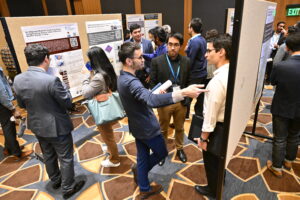We are excited to announce that two members of the STAIR Lab will be presenting their research at the upcoming 2025 NHERI Computational Symposium. This symposium gathers leading experts in computational modeling and simulation to discuss advances in research and technology for infrastructure resilience. Our lab’s contributions highlight innovative work in system identification and finite element modeling, with a strong focus on open-source tools and frameworks that promote reproducible research.
Chrystal Chern: System Identification and BRACE2
Chrystal Chern will be presenting her latest research on system identification methods as part of the BRACE2 project. BRACE2 centers around the development of a web-based platform for real-time structural health monitoring, enabling researchers and engineers to evaluate structural performance during seismic events and other extreme conditions. Chrystal’s work focuses on advanced techniques for identifying system parameters, improving accuracy and efficiency in structural health monitoring.
Her research is implemented in the mdof open-source library, which provides tools for multi-degree-of-freedom system identification and is used on https://structures.live. You can explore more about mdof through its official documentation and learn about the BRACE2 project on our lab’s BRACE2 research page.

Claudio Perez: Contributions to OpenSees
Claudio Perez will be showcasing recent contributions to the OpenSees finite element analysis framework, a powerful tool for simulating the seismic response of structural systems. This includes a fundamental reworking of the frameworks formulation of geometric nonlinearity, furnishing improvements in both accuracy and performance. Claudio’s work is part of an effort to enhance OpenSees to integrate modern computational tools and AI-driven workflows, ensuring that the framework remains at the forefront of computational modeling.
Claudio will also highlight tools developed by our lab, including veux, an open-source visualization library designed to produce publication-quality renderings for finite element models. veux enables researchers to generate high-quality visual representations of their simulations with ease. You can learn more about our OpenSees-related research here and explore the veux library at veux.io.

Join Us at the Symposium!
We are looking forward to connecting with researchers, practitioners, and students at the 2025 NHERI Computational Symposium. If you are attending, be sure to join Chrystal and Claudio’s presentations to learn more about our work on system identification, structural health monitoring, and advancing open-source tools in computational modeling.
For more information on our lab’s ongoing research and projects, visit the STAIR Lab website. Stay tuned for updates and follow us on our journey to improve computational tools for the next generation of resilient infrastructure!
